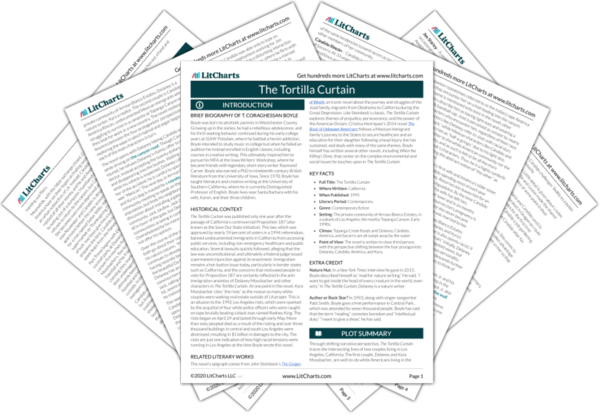Many key plot points in the novel occur on or near the canyon road, most notably the car accident in which Delaney hits Cándido. However, the road is most important for the emotional impact it has on the characters. The road represents a place of hyper-visibility and extreme alienation. When Delaney hits Cándido with his car, he finds himself wondering: “How could no one have seen what happened? How could no one have stopped to help, bear witness, gape, jeer—anything? A hundred people must have passed by in the last five minutes and yet he might as well have been lost in the Great Painted Desert for all the good it did him.” In this way, the canyon road is a paradox: despite the fact that one is hyper-visible on the road, one can also be invisible. Yet, this invisibility is not afforded to Cándido or América; it seems to be a privilege of being part of the racial and economic majority. Every time Cándido or América is on the road, they feel particularly vulnerable. América feels as though she is “alone on a terrible howling stage, caught there for everyone to see.” This visibility is a threat to people like América and Cándido because if “any one of [the cars]” on the road can stop, anyone could potentially report América and Cándido and have them deported. Furthermore, the canyon road seems to be always roaring with traffic, and thus also represents physical danger, particularly to Cándido and América, whose only means of transportation is walking. Regardless of their race, all the characters in the novel find the canyon road overwhelming and isolating, despite (or perhaps because of) how busy it is. In this way, the road also comes to symbolize the frenetic pace of American culture, as well as people’s insensitivity to the plights of their fellow humans. At the same time, the characters’ shared dislike of the road suggests that the desire to belong and to be seen for the “right” reasons is a universal one.
The Canyon Road Quotes in The Tortilla Curtain
He sat up and railed […] he told her his fears, outlined the wickedness of the gabacho world and the perfidy of his fellow braceros at the labor exchange, tried to work the kind of apprehension into her heart that would make her stay here with him, where it was safe, but she wouldn’t listen. Or rather, she listened—“I’m afraid,” she told him, “afraid of this place and the people in it, afraid to walk out on the street”—but it had no effect.

Unlock explanations and citation info for this and every other The Tortilla Curtain quote.
Plus so much more...
Get LitCharts A+









